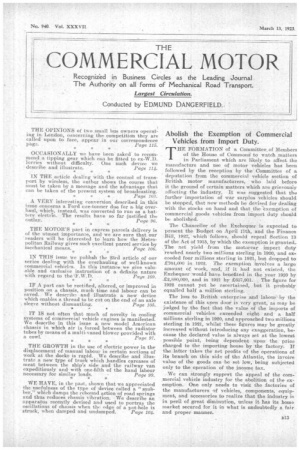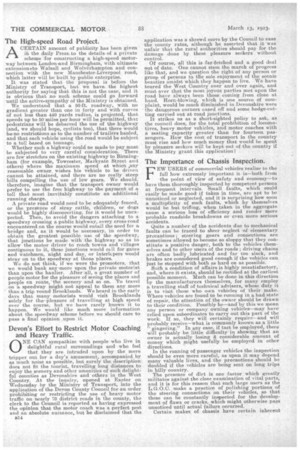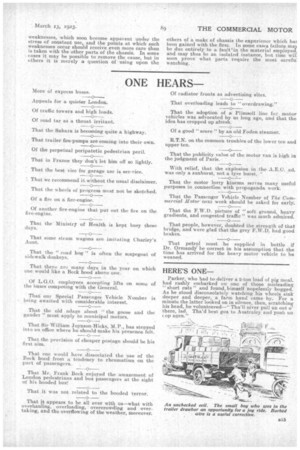Abolish theExemption of Commercial Vehicles from Import Duty.
Page 1

Page 2

Page 3

If you've noticed an error in this article please click here to report it so we can fix it.
THE FORMATION of a Committee of Members of the House of Commonsto watch matters in Parliament which are likely to affect the manufacture and use of motor vehicles has been followed by the reception by the Committee of a ' deputation from the commercial vehicle section of British motor manufacturers, who laid before it the ground of certain matters which are grievously affecting the industry. It was suggested that the further importation of war surplus vehicles should be stopped, that new methods be devised for dealing with the stOcks on hand and that.the `exemption of commercial goods -vehicles from import duty should
be abolished. ,
The Chancellor of the Exchequer is expected to present the Budget on April 17th, and the Finance -Bill, 1923,. which follows, should repeat Section 13 of the At of 1915, by which the exemption is granted., , The net yield from the motorcar import duty -reached nearly two•millions sterling in 1920, and exceeded four millions sterling in 1921, but dropped to 764,000 in 1922. The exemption involves a largo amount of work, and, if it had not existed, the Exchequer 'would have benefited in the year 1920 by £2,880,000, and in 1.921 by £657,931. . The figure for 1922 cannot yet be ascertained, but it probably
equalled half a million sterling. •
The loss to British enterprise and labour by the existence of this onen door is very great, as may be judged by the fact that the value of the. imports of commercial vehicles exceeded eight and a . half millions sterling in 1920, and approached two millions sterling in 1921, whilst these figures may be greatly increased without introducing any exaggeration, because the declared value is always set at the lowest possible point, being dependent uponthe price charged to the importing house by the factory. If the latter takes the net profits of the operations of its branch on this side of the Atlantic, the invoice value of the goods can be set low, being subjected only to the operation of the income tax.
We can strongly support the appeal of the coin; mercial vehicle industry for the abolition of the exemption. One only needs to visit the factories of the manufacturers of vehicles, components, equipment, and accessories to realize that the industry is in peril of great diminution, unless it has its home market secured for it in what is undoubtedly a fair and proper manner.
The High-speed Road Project.
ACERTAIN amount of publicity has been given ill the daily Press,to the details•of a private
scheme for constructing a: high-speed motorway between London-and Birmingham, with ultimate extension to Walsall and Wolverhampton and connection with the new Manchester-Liverpool road, which latter will be built by public enterprise. It was stated that the proposal is before the Ministry of Transport, but we have, the highest authority for saying that this is not the case, and it is obvious that no such scheme could go forward until the activeesympathy of the Ministry is obtained. We understand that a. 50-ft. roadway, with no gradient greater than one in forty and with curves of not less than 440 yards radius, is projected, that speeds up to 50:miles per hour will be permitted, that pedestrians will be debarred the use of the highway (and, we should hope, cyclists too), that there would be•no restrictions as to the number of trailers hauled, and that each vehicle using the road would be subject to a toll based on tonnage. , Whether such a highway could be made to pay must be subjected to very careful consideration. There are few stretches on the existing highway to Birming ham (for example, Towcester, Markyate Street and others) where the maximum speed at which any reasonable owner, wishes his vehicle to be driven cannot he attained, and there are no really steep hills compelling the use of low gears. We should. therefore, imagine that the transport owner would prefer to use the free highway to the payment of a toll that must inevitably constitute an additional running charge. A private road would need to be adequately fenced, or the presence of stray cattle, children, or dogs would be highly disconcerting, for it would be unex pected. Then, to avoid the dangers attaching to a speedway crossing a public highway, every cross-road encountered on the course would entail the need for a, bridge and, as it would be necessary, in order to
obtain the greatest possible use of the speedway, that junctions be made with the highway so as to
allow the motor driver to reach towns and villages contiguous to it, these junctions would call for gates and watchmen, night and day, or interlepers would stray on to the speedway at those places. We do not think, if we were the promoters, that we would bank any more upon the private motorist than upon the haulier. After :all, a great number of people motor for the pleasure of seeing the places and people en route, 'the scenery and so on. To travel . on a speedway might not appeal to them any more ' than a trip round Brooklands. We heard in the early days that many motorists would visit Brooklands
solely for the' pleasureof travelling at high speed over the course, but we have rarely known it to happen. We would like much more information about the speedway scheme before we should care to pass a final opinion .upon it.
Devon's Effort to Restrict Motor Coaching and Heavy Traffic. . and Heavy Traffic. .
0 NE CAN sympathize with people who live in delightful rural surroundings and who feel that they are intruded upon by the mere tripper out for a day's amusement, accompanied by as much noise as possible, but surely the description: does not fit the tourist, travelling long distances to enjoy the scenery. and other amenities of such delightful counties as Devonshire and others in the West Country. At the inquiry, opened at Exeter on Wednesday by the Ministry of Transport, into the application of the Devon County Council for an order prohibiting or restricting the use of heavy motor traffic on nearly ',"0 district roads in the county, the clerk to the Council is reported as having expressed the opinion that the motor coach was a perfect pest and an absolute nuisance, but he disclaimed that the
al4 application was a shrewd move by the Council to ease the county rates, although he asserted that it was unfair that the rural authorities should pay for the damage done by these pleasure seekers without control.
Of course, all this is far-fetched and a good deal out of date. :One cannot stem the march of progress like that, and we question the right of any person or group of persons to tile sole enjoyment of the scenic beauties amidst which they happen to live. We have toured the West Country over and over again, and must aver that the most joyous parties met upon the road have always been those coming from close at hand. Horn-blowing, :ehich is one source of complaint, would be much diminished in Devonshire were the dangerous corners eased off and some hedge-cutting carried out at road junctions. It strikes us as a short-sighted policy to ask, as the council does, for the total prohibition of locomotives, heavy motor vehicles, and motor coaches with a seating capacity greater than for fourteen passengers. How the cost of transport in the country must rise and how much money that would be spent by pleasure seekers will be kept out of the country if the Ministry grant this application! .
The Importance of Chassis Inspection.
FEW USERS of commercial vehicles realize to the full how extremely important it is—both from :the point of view of safety and economy—to have them thoroughly inspected by competent persons at frequent intervals. Small faults, which could easily be made good' if taken in time, are apt to be unnoticed or neglected, and it is surprising how soon a multiplicity of such faults, which by themselves would be but trifling, when taken in the aggregate cause a serious loss of efficiency and render more probable roadside breakdowns or even more serious accidents.
Quite a number of the accidents due to mechanical faults can be traced to sheer neglect :of elementary precautions ; steering gears and connections are sometimes allowed to become so sloppy that they constitute a positive danger, both to the vehicles themselves and to ether users of the roads ; driving chains are often badly lubricated and far too slack, and brakes are considered good enough if the vehicles can just be stopped with both as hard on as possible.
Such a condition of affairs is highly unsatisfactory, and, where it exists, should be rectified at the earliest possible moment. Much can be done in this direction by the manufacturers themselves, for many employ a travelling staff of technical advisers, whose duty it is to visit those who own vehicles of their make. Where vehicles are found to be running in a had state of repair, the attention of the owner should be drawn to their condition. Possibly he—and by this we mean any person or company owning vehicles—may have relied upon subordinates to carry out this part of the work. If so, they will certainly require—and will probably receive—what is commonly known as a little " gingering." In any case, if tact be employed, there Will probably be little difficulty in showing that an owner is actually losing d considerable amount of money which might usefully be employed in other directions.
In the running of passenger vehicles the inspection should be even more careful, as upon it may depend many valuable lives, and the precautions should be doubled if the vehicles are being sent on long trips in hilly country.
The presence of dirt is one factor . which greatly militates against the close examination of vital parts, and it is for this reason that such large users as the L.G.O.C. make a practice of polishing portions of the steering connections on their vehicles, so that these can be constantly inspected for the development of flaws or cracks, which might otherwise pass unnoticed until actual failure occurred.
Certain. makes of chassis have certain inherent weaknesses, which soon become apparent under the stress of constant use, and the points at which such weaknesses occur should receive even more care than is taken with the other parts of the chassis. In some eases it may be possible to remove the cause, but in others it is merely a question of using upon the others of a make of chassis the experience which hai been gained with the first. In some cases failure mae be due entirely to a fa,ultiin the material employed. and may thus be an isolated instance, but time will soon prove what parts require the most eareful watching.
































